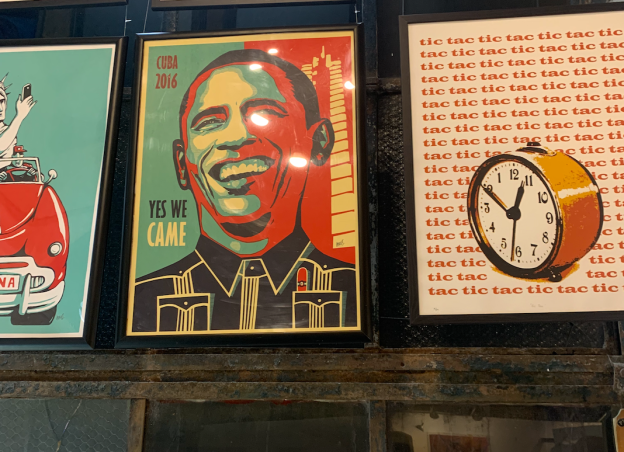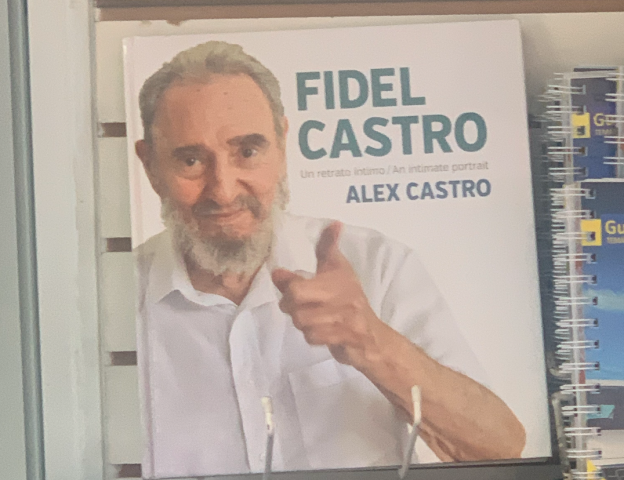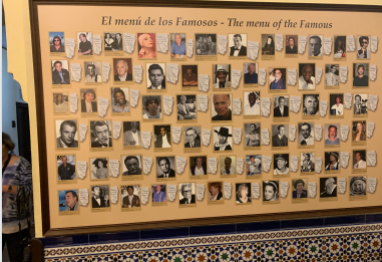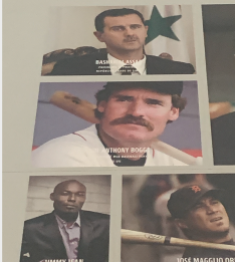 “Just so you know, I’m going to be quoting ‘Godfather II’ for the whole trip,” I said to a roomful of our traveling companions, as well as numerous times to my wife, prior to our visit to Cuba. An indication of my American solipsism, along with my tendency to make absolutely everything about movies? Yes and yes.
“Just so you know, I’m going to be quoting ‘Godfather II’ for the whole trip,” I said to a roomful of our traveling companions, as well as numerous times to my wife, prior to our visit to Cuba. An indication of my American solipsism, along with my tendency to make absolutely everything about movies? Yes and yes.
Nevertheless, in the seven days we spent in Cuba, I took in a lot more, about history, about socialism, and about the way national myths are constructed. Quite an illuminating journey, and one that I really hope Americans are going to be continue to be able to take.
My wife and I traveled to Cuba as part of a delegation of around 30, mostly associated with our synagogue, Temple Sholom in Broomall, although not everyone on the trip was a member. The purpose of our trip was to meet with and deliver aid to the small Jewish community in Cuba, and we all traveled on education/religious visas. I also did some journalism on the trip, but the Cuban government didn’t know about that.
We visited Havana, Santa Clara, Trinidad, and Cienfuegos, before returning to Havana at the end. I wrote for the Jewish Telegraphic Agency about my interactions with the Jewish community in Cuba, and their struggles in obtaining traditional Jewish foods, here. I also wrote for AppleInsider about the country’s nascent Apple subculture. This post is for the rest of my observations from the trip, that didn’t make it into the other pieces.
And yes, I took the advice of this piece, listing cliches to avoid while reporting on Cuba. In none of my writing from the trip will you see references to Cuba being “frozen in time,” a “forbidden island,” or to expressing that I’m glad I got to see Cuba “before it changes.” I also went places besides Havana.
On the trip, we visited the small Jewish community, who we visited in five different places on the island. There aren’t many of them, they don’t have rabbis, the population is aging, and (per the JTA link above) they can’t even get challah or bagels. But they’re keeping up hope, and are very thankful to have American visitors.
The Jews in Cuba, virtually unanimously, say they’re not worried about anti-Semitism in Cuba, but very much worried about it in the United States. They’re also very Zionist, and one staffer at the big synagogue in Havana was even wearing a Mossad t-shirt.
However, they’re very much not fans of Donald Trump, something they had in common with just about everybody on our trip.
About a half dozen times over the course of the year between our booking the trip and actually leaving, the Trump Administration announced new travel restrictions to Cuba, although thankfully none of them affected our trip.
You probably know some version of the history. Cuba was, and is, a communist country that was allied with the Soviet Union during the Cold War. The U.S., for all that time and ever since, has held an embargo in place preventing goods from reaching the island. The idea is that strain from the embargo will force Cuba to overthrow their government, but 60 years on, that hasn’t happened and shows no signs of doing so any time in the future.

President Barack Obama, in 2015, normalized trade relations with Cuba, even visiting the country the following year. But the Trump Administration has since reversed some of the Obama-era changes. Not all though- Cuban rum and cigars are still allowed into the country, which I’m guessing came due to pressure from various Trump cronies.
Where does this all leave Cuba? The nation now finds itself dependent on income from tourists, both the dwindling amount from the U.S. and those from other countries. Therefore, Cuba ends up with essentially a bifurcated society in which tourists spend money and live like kings, while the natives live on rations and other scraps. Tourists even use a different currency (“CUCs”) than Cuban citizens.
Yet even in a country with no democracy and not much freedom, there is a great deal of hustle. For example: We visited the Cohiba cigar factory in Havana. We were told that while workers at the factory are paid a negligible daily stipend, every employee, per longstanding tradition, gets five cigars a day. Which they then, of course, sell.

Have a cigar
From what I saw of Cuba, it certainly didn’t make me wish for America to turn to that specific strand of socialism. Then again, I don’t believe that Bernie Sanders, or even those to the left of him, are seeking to turn America into Cuba. Denmark, maybe.
The country, meanwhile, is festooned with iconography of Fidel Castro and Che Guevara. At the bookstores, every book is about them. Makes one feel kind of bad for the current First Secretary of the Communist Party of Cuba, Raul Castro, whose picture is absolutely nowhere. Meanwhile, The current president is Miguel Díaz-Canel, but his name is rarely mentioned, there are no pictures of him anywhere, and I just had to look up his name because I didn’t remember it.

An incongruously funny picture of Fidel Castro.
Yet ironically, the Fidel Castro/Donald Trump parallels are uncanny. Both have dictatorial and authoritarian tendencies, disrespect for democracy, deep ties to the Russians, a weakness for giving key government jobs to relatives, and a tendency to deliver televised speeches that go on for hours. Also, both have inspired absolutely insane fan art. Trump is Castro, Castro is Trump.
Also, there’s a Rosenbergs memorial! I wasn’t sure if Fidel put that up because he thought they were innocent, or to thank them for being guilty. Probably the latter.

The other famous effect of the embargo? 1950s muscle cars, everywhere! Most of them incredibly well-preserved, especially in the paint jobs, although one we rode in had an empty space where the car radio used to be.
No, I didn’t quote The Godfather: Part II for the entire trip, but I did notice some familiar things. Meyer Lansky, the real-life Hyman Roth, built the Riviera, the Havana hotel that was next to ours. “And there isn’t even a plaque, or a signpost or a statue of him in that town!”

We also visited the Hotel Nacionale, another pre-revolution mob stronghold, which includes a special room featuring pictures of all the dignitaries who have visited the place over the years. It’s an eclectic mix of athletes, entertainers, and bloodthirsty dictators. It’s the only place I’ve ever seen the pictures of Bashar al-Assad and Wade Boggs side by side.
No, the Superman Show doesn’t exist, and hasn’t since the revolution. But “Superman” was a real guy, and this piece from 2015 by Mitch Moxley, which looked into his mysterious backstory, is a masterpiece of international reporting.
Speaking of movies, only a handful of Hollywood films were shot in Havana during the Obama-era thaw. One of them? That’s right, Fast & Furious 8. Our hotel was right near the spot where Vin Diesel’s car went into the ocean:
On the entire trip, I saw only one movie theater, and it appeared to be closed. Yet despite that, and the embargo, every Cuban I met seemed to have nearly encyclopedic knowledge of Hollywood movies. The talented film critic Monica Castillo, a couple of years ago, visited some of the island’s theaters.
Also, I saw Steven Spielberg’s picture all over the place. That might be because we went to a lot of Jewish places, and he must have gone to all of them, too
Yes, we visited Ernest Hemingway’s old estate, including his pool, where Ava Gardner used to swim nude:

Throughout the trip, our tour guide gave us the government-approved version of history, complete with some tale tales about “miracle medical cures” that its doctors have developed (other countries do this too, Israel especially.) She would go on to imply that the microphone she was using was bugged by the government. Much of the trip brought to mind Yakov Smirnoff’s old joke: “In America, you can say whatever thing you want, about Reagan. And in Soviet Union, you can say whatever thing you want, about Reagan.”
The Internet? We were able to get it in our hotels only, although I’m told for actual Cubans, access is unreliable, censored and incomplete.

A street vendor in Havana sports a Kobe Bryant jersey, the day after the NBA legend’s death.
The first time we logged on, we got about 15 alerts about Kobe Bryant’s death. The next day, we learned there was an earthquake in Cuba, leading to fearful texts from just about everyone we know. The quake, alas, was on the other side of the country, and we didn’t feel it. Though we’d have been pretty screwed in an the event of a tsunami, since our hotel was a block from the water, protected by a tiny seawall that got overtopped more than once.
Also, as you may have heard, Cuba is a baseball country, and the home nation of numerous baseball players you probably know. We even visited a practicing baseball team. A deal was in the works to make it possible for Cuban baseball players to come to the major leagues without having to defect, but, you guessed it, Trump scuttled that as well.

It was interesting, though, that the Cuban national team shirts we saw for sale all had the names of players like Yasiel Puig, who have defected to the U.S. We got them for our kids, although I vetoed the purchase of an Aroldis Chapman jersey, for both domestic abuse and Yankee reasons.

Cuba is one of those places that I’d known of for my entire life, and I’m glad I had the opportunity to visit it. I don’t know which direction things are going to go there, but I really hope for there to be more freedom for the people on the island, and more opportunities for Americans to visit them there.

